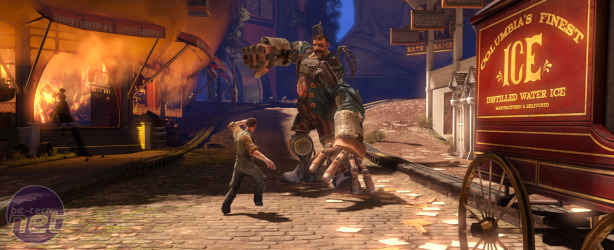
That’s not to suggest that the combat is a low point; it’s a little less interesting than the first game that incentivised thoughtfulness, but that’s made up for in scale and speed. Infinite’s greatest tool is the Skyhook, a deadly melee weapon with automated whirling blade, but it also allows you to use “Sky-Lines”. These are rails that act as a sort of mass transit system. In practice they’re used to allow you to traverse a massive environment in moments and so the combat sections can be opened up and cover a great deal of ground.
There’s not a great deal of outlandishness to the weaponry, all of it conforms to what you’d expect from the time period, but what it lacks in wow factor is made up for in variety with the full range of pistols, rifles, shotguns, grenade launchers and the like covered. The more interesting options are conferred in the game’s “Vigors”: magical powers that emanate from your hand. These let you summon murderous crows, control enemy robotics or cover massive distances in an instant for an immediate melee hit.

A rather more tenuous addition are different types of clothing you can pick up that confer different abilities, such as a spectral gun that attacks your foes whenever you swap it out for a different option, health bump from melee kills or an automatic reload for your weapons when jumping on Sky-Lines. All of this amounts to a game that allows you to find a style you prefer and stick to it.
Once caught up with, it could've been the case that Elizabeth was one long burden, as the game turned into a massive escort quest, but actually she does nothing to get in the way at any point and often actively helps out. She’ll notice that you’re running low on health or ammo and hurl some over to you, while also lending you the ability to create objects from thin air for tactical advantage.

It’s somewhat of a disconnect once you realise that unless it’s a scripted sequence, enemies don’t notice her at all, but it seems like a decision made for gameplay’s sake and the oddity is far less of a problem than the potential frustration that her taking damage could actually cause. Any feeling of frustration toward her would be a failure of design, because the entire rest of the game is about making you care for, understand and grow to empathise with her character. Elizabeth has an incredible emotional arc here that establishes her as an iconic figure.
This review focuses on the game from a largely mechanical standpoint because delving too deep into the themes and story, which are by far Bioshock Infinite’s unmissable features, would be a disservice to anyone. It’s an adult, thoughtful and compelling work that shames many (if not most) other attempts in the medium. Bioshock Infinite is an incredibly good video game. It might be one of the best.
There’s not a great deal of outlandishness to the weaponry, all of it conforms to what you’d expect from the time period, but what it lacks in wow factor is made up for in variety with the full range of pistols, rifles, shotguns, grenade launchers and the like covered. The more interesting options are conferred in the game’s “Vigors”: magical powers that emanate from your hand. These let you summon murderous crows, control enemy robotics or cover massive distances in an instant for an immediate melee hit.

A rather more tenuous addition are different types of clothing you can pick up that confer different abilities, such as a spectral gun that attacks your foes whenever you swap it out for a different option, health bump from melee kills or an automatic reload for your weapons when jumping on Sky-Lines. All of this amounts to a game that allows you to find a style you prefer and stick to it.
Once caught up with, it could've been the case that Elizabeth was one long burden, as the game turned into a massive escort quest, but actually she does nothing to get in the way at any point and often actively helps out. She’ll notice that you’re running low on health or ammo and hurl some over to you, while also lending you the ability to create objects from thin air for tactical advantage.

It’s somewhat of a disconnect once you realise that unless it’s a scripted sequence, enemies don’t notice her at all, but it seems like a decision made for gameplay’s sake and the oddity is far less of a problem than the potential frustration that her taking damage could actually cause. Any feeling of frustration toward her would be a failure of design, because the entire rest of the game is about making you care for, understand and grow to empathise with her character. Elizabeth has an incredible emotional arc here that establishes her as an iconic figure.
This review focuses on the game from a largely mechanical standpoint because delving too deep into the themes and story, which are by far Bioshock Infinite’s unmissable features, would be a disservice to anyone. It’s an adult, thoughtful and compelling work that shames many (if not most) other attempts in the medium. Bioshock Infinite is an incredibly good video game. It might be one of the best.
-
Overall95 / 100


MSI MPG Velox 100R Chassis Review
October 14 2021 | 15:04









Want to comment? Please log in.